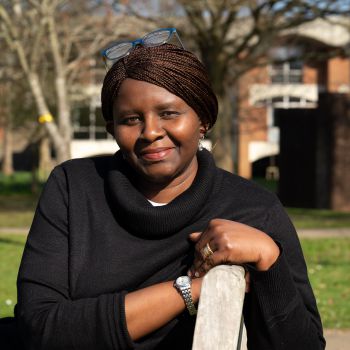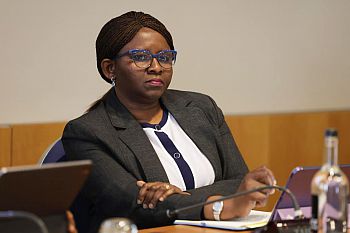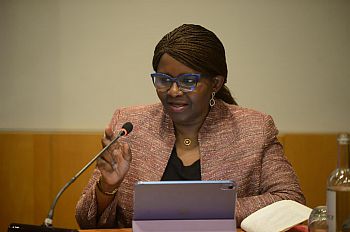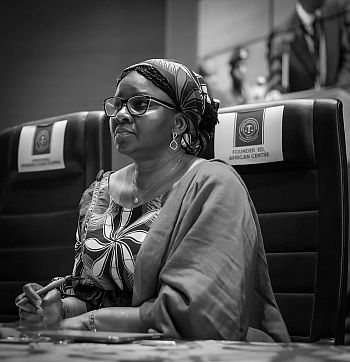News
Spotlight on Researchers: Juliet Ibekaku-Nwagwu
Posted on behalf of: Sussex Researcher School
Last updated: Wednesday, 30 July 2025

- Video Transcript
-
[MUSIC: Soft Pulse Synth]
[TITLE CARD: Animated image of a black hanging lamp with a light yellow ray of light coming from it. Inside the ray of light the text 'Spotlight on Researchers' appears. Background is sunshine yellow.]
Juliet Ibekaku-Nwagwu:
My name is Juliet Ibekaku-Nwagwu. I'm a postgraduate researcher at the University of Sussex with the School of Law, Politics and Sociology. I am affiliated with The Centre for the Study of Corruption.
My research examines the variety of practices around the international proceeds of crime regime, which is embedded within the United Nations Convention Against Corruption.
The essence of returning proceeds of crime or proceeds of corruption is to support Sustainable Development Goals, particularly in communities where there is a need for better health services and education.
Ultimately, my goal is that, at the end of my research, I’ll be able to set up an open asset recovery database. This database would be publicly available and would host information on cases around the world.
It's an opportunity to challenge some of the practices that are not in line with international standards.
[END CARD: Black hanging lamp with light yellow ray of light. Inside the ray of light the text 'Interview by the Sussex Researcher School'. Background is deep aquamarine with a strip of sunshine yellow at the top.]
The Journey to a PhD
My journey started when I graduated from law school in 1993 and was subsequently called to the Bar. At the beginning of my career, I worked briefly with a civil society organization on issues around women's rights, gender justice, and the rule of law. My first master’s degree was in international human rights law. With this background, my work has traversed international criminal law, human rights law, development, economic and financial crimes and currently transnational anti-corruption law.
In 2003, I was invited by the Nigerian government to join the Nigerian Economic and Financial Crimes Commission (EFCC). It was set up to tackle corruption, economic and financial crimes. My development experience, and work with international organizations, enabled me to support the EFCC in setting up new departments on international cooperation, and the training academy.
This unexpectedly changed the trajectory of my career from solely working with international organizations towards government roles. Whilst I enjoyed working with institutions such as USAID and the UN, it was an honour to be asked to work for the Nigerian government. It was also a pivotal time for Nigeria, as it was transitioning from military rule to democracy. My focus was ensuring that democratic values were embedded into the new government systems.

My interests shifted towards financial crime and international criminal law, particularly financial intelligence and proceeds of crime. I worked across a variety of roles, including the UK Commonwealth Secretariat, the Financial Action Task Force Regional Body in West Africa and GIABA. These roles provided in-depth experiences, from investigation to the end goal of recovering proceeds of corruption and bringing them back into the country.
I served as the advisor to the former President of Nigeria, working with international systems and global partners to identify and repatriate proceeds of crime to Nigeria. The UN Convention Against Corruption (UNCAC) mandates that countries must trace and return illicit funds to their origin. However, in practice many factors come into play, with asset return becoming a politically contested issue which often diverges from what the international system advocates.
My work in this field inspired me to further investigate the reluctance in implementing international law efforts to return proceeds of crime and the potential causes. Despite the legal systems of many countries acknowledging the ownership of assets, they are often not returned to the countries of origin. This issue isn’t specific to African countries as other countries in Asia and Central America are facing the same challenges.
I did my second master’s in Governance and Corruption at Sussex via distance learning, whilst still in Nigeria. The University’s interdisciplinary approach to the study of law led me to do my PhD at Sussex, as I wanted to explore various dimensions to the study of international regimes.
The Research
The focus of my research is examining the extent of the implementation of the legal systems for international asset return. I build on studies showing countries failure to implement UNCAC mandates, which weakens the effectiveness of international standards. This has social, economic, and political consequences. It denies victims of corruption in developing countries the opportunity to hold their leaders accountable. It also prevents the use of returned assets for sustainable development and improving the well-being of individuals living in poverty.

The real issues are social, political and tied to foreign policy, rather than deficiencies within the law. Therefore, I’m situating my work within a constructivist and normative theoretical framework. My method includes qualitative analysis, semi-structured interviews and case analysis. This approach allows me to go beyond legal analysis to gather data from officials and non-state actors to undertake empirical research. The biggest challenge is the volume of information that I have to process and analyse.
My research aims to provide a better understanding of the return of proceeds of crime to countries of origin. It advocates that a shared international approach will lead to social and economic development, particularly in developing countries. I draw on case studies of civil society organizations and government actors working together to implement social programs with returned assets, to support sustainable development goals. These cases offer valuable lessons for other countries and through highlighting these in my research I aim to provide a practical contribution to the field.
I’m working on compiling and analysing cases to create an open ‘asset recovery framework’ database. The database will document cases, provide legal precedents, and offer a clearer understanding of how countries interpret the Proceeds of Crime regime. It will help challenge practices that don’t align with international standards and be a resource for researchers, academics, and practitioners.
My ultimate goal is that my research will lead to recommendations to address the gaps in understanding of the Proceeds of Crime regime. By increasing the effectivity of international standards, this will ensure that assets are returned by all countries and used to support sustainable development.
Achievements and the Future
I founded an organization called the African Centre for Governance, Asset Recovery, and Sustainable Development. I’ve spoken at conferences, including at the African Development Bank, where I advocated for better approaches to help African countries negotiate the return of their assets.

In 2024 I was appointed the convener of the Commonwealth Lawyers Association’s Anti-Corruption Committee, where I work with lawyers across 53 Commonwealth countries. I was also nominated as the Chair of the Global (UNCAC) Coalition’s Working Group on Victims of Corruption. Recently the African Development Bank asked me to support the South African G20 Presidency, and its Anti-Corruption Working Group, to formulate a set of High-Level Principles on the Management of Seized and Confiscated Assets. This recognition is a testament to my work in this field, whilst providing a platform to make advancements and integrate my research findings into international discussions.
As a Sussex PGR representative, I sit on a number of committees including the PGR Experience Sub-committee. This is a valuable feedback mechanism, as it gives PGRs a space to discuss their experiences. Prior to this I was the international student representative for the Law School.
Beyond my PhD, I will continue advocating for change in the Proceeds of Crime regime and related policies. A key goal for me is to expand the database I’m working on and make it publicly available as an international open-source resource.
I want to continue to focus on research, writing, governance, and development, whilst aiding with reform and meaningful change.
* The Proceeds of Crime regime is an aspect of the United Nations Convention Against Corruption, signed by more than 191 countries to identify, recover and return assets obtained through criminal activity.
Are you an PGR and like to be featured in the series?
If so Apply Here

